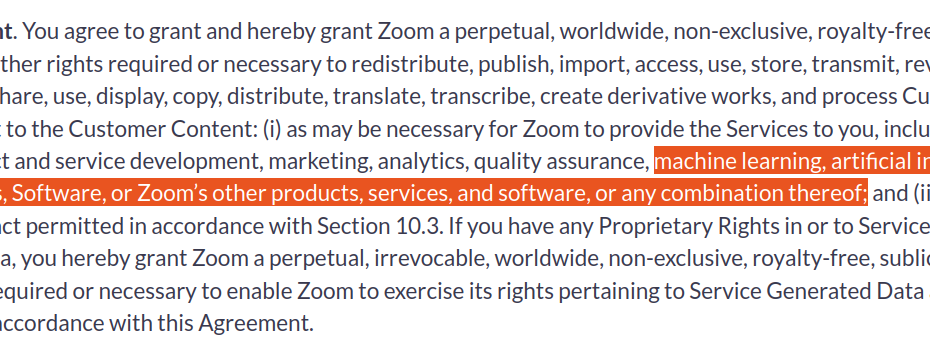UPDATE 2: August 8, 5:00 AM Pacific
On August 7, Zoom updated their terms to include a line that specifies that Zoom will only use Customer Content to train AI models with consent from the host. Specifically, the new line reads:
“Notwithstanding the above, Zoom will not use audio, video or chat Customer Content to train our artificial intelligence models without your consent.”
This change is in line with what I suggested in “Update 1”, below.
A couple notes on this change:
- If the meeting host enables data sharing, that impacts all the attendees. Given that power differentials often exist between meeting hosts and attendees, this dynamic creates the potential for abuse and coercion. This is comparable to the power imbalances in Zoom’s mothballed “attention tracking” which was removed after pushback from privacy advocates and, well, decent humans.
- Sharing can be enabled via a checkbox; selecting the option is what Zoom means when they say “consent.” That’s not necessarily a bad thing, but it’s important to understand what “consent” means in this context, especially given that the tech industry writ large has a execrable track record when it comes to respecting consent.
END UPDATE 2
—
UPDATE 1: August 7th, 8:30 AM Pacific.
Over on the Zoom blog, Zoom explains what their user interface does. Specifically, the post describes how people can enable or disable the features that trigger data collection to feed machine learning or artificial intelligence.
This is interesting information, but it’s NOT THE SAME AS GUARANTEEING USER RIGHTS IN THEIR TERMS.
If Zoom wants to have their terms mirror their practice, they would include language in their legally binding policies ensuring that users need to opt in to these features, that opt-in is the default, and that if the defaults change the policy would be updated to reflect the changes. This could be done with the addition of three sentences: “Zoom will never use meeting information to develop machine learning or artificial intelligence unless the meeting host opts in to sharing this data. Zoom provides options to opt in and/or opt out in the user interface of the Zoom service. If this changes, we will update these terms.”
User interfaces can and do change without notice. These changes are hard to track, and Zoom knows this. Showing UI features in a blog post shows Zoom’s intent, but that doesn’t change what the terms say. Actual words mean actual things, and until Zoom makes binding commitments in their legally binding policies, we should believe the words written in their policies.
END UPDATE 1
—
ORIGINAL POST
Over on Mastodon, folks are noting that Zoom’s most recent terms (dated July 27, 2023) allow Zoom to use “Customer Content” to develop machine learning and artificial intelligence.
Specifically, the clause getting attention is from section 10.4, the “Customer License Grant.”
“You agree to grant and hereby grant Zoom a perpetual, worldwide, non-exclusive, royalty-free, sublicensable, and transferable license and all other rights required or necessary to redistribute, publish, import, access, use, store, transmit, review, disclose, preserve, extract, modify, reproduce, share, use, display, copy, distribute, translate, transcribe, create derivative works, and process Customer Content and to perform all acts with respect to the Customer Content: (i) as may be necessary for Zoom to provide the Services to you, including to support the Services; (ii) for the purpose of product and service development, marketing, analytics, quality assurance, machine learning, artificial intelligence, training, testing, improvement of the Services, Software, or Zoom’s other products, services, and software, or any combination thereof; and”
Zoom reworked their terms significantly between February 1, 2023 and March 31, 2023 . The problematic language about machine learning was added in the March 31, 2023 update. This doesn’t alter the reality that Zoom claims broad rights over Customer Content, including use in developing machine learning and artificial intelligence. The open question is how long Zoom was using customer data in this way, and whether or not the terms update in March 2023 was done to disclose a shift in Zoom’s data use, or whether the disclosure was designed to have Zoom’s terms correspond with Zoom’s existing practice. This would be similar to how Google changed their terms last month to bring them up to date with Google’s existing practice.
